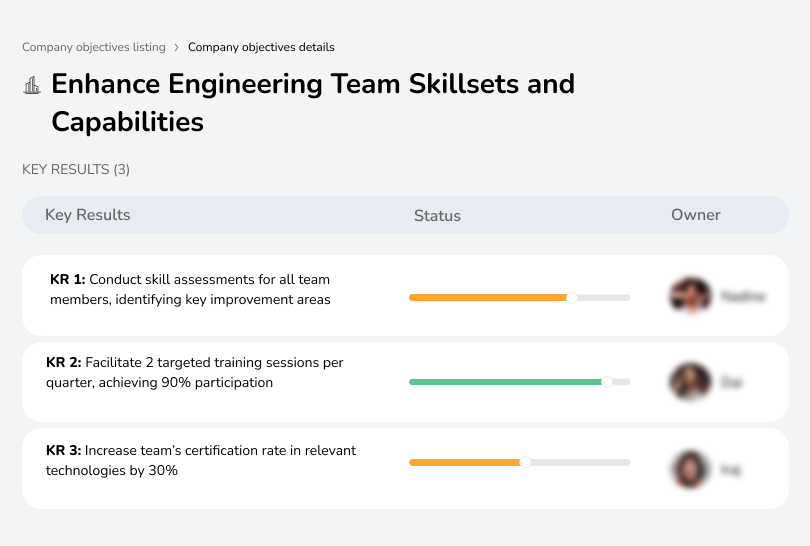Free OKR Templates
Download templatesEngineering teams are responsible for designing, developing, and improving products, systems, and processes. They apply technical expertise to solve complex problems and create innovative solutions that enhance product quality and operational efficiency.
These teams work across various stages of production, from initial design to final implementation, collaborating with other departments to ensure seamless integration and performance. They also focus on testing and refining designs to ensure reliability and compliance with industry standards.
In addition to problem-solving and innovation, engineering teams continuously seek ways to optimize existing systems and drive efficiency, cost-effectiveness, and sustainability improvements. Their expertise and creativity are crucial in maintaining competitive advantage and driving the success of an organization
15 OKR Templates for Engineering Teams (Manufacturing)
1. Challenge: High bug count and frequent failures impacting user experience.
Objective: Improve Product Quality and Reliability
Due Date: 6 months
Owned by: Engineering Teams
- KR1: Reduce critical bugs in production by 30% through enhanced testing protocols
- KR2: Achieve 95% success rate in automated regression tests before each release
- KR3: Implement a root-cause analysis process for all major defects, improving team accountability
2. Challenge: Long development cycles delaying time-to-market for key features.
Objective: Accelerate Release Cycle to Enhance Delivery Speed
Due Date: 4 months
Owned by: Engineering Teams
- KR1: Decrease average release cycle time by 20% by optimizing development workflows
- KR2: Increase use of CI/CD practices, with 90% of projects using automated deployment
- KR3: Improve code merge efficiency, reducing integration time by 25%
3. Challenge: System latency and poor load times affecting user satisfaction.
Objective: Boost System Performance to Improve User Experience
Due Date: 5 months
Owned by: Engineering Teams
- KR1: Decrease average page load time by 30% by optimizing code and assets
- KR2: Reduce server response time by 20% through improved query handling and caching
- KR3: Increase capacity by 15% to handle peak loads without performance degradation
4. Challenge: Inconsistent code quality leading to higher technical debt.
Objective: Strengthen Code Quality and Documentation
Due Date: 3 months
Owned by: Engineering Teams
- KR1: Conduct 90% of code reviews using standard checklists for quality assurance
- KR2: Improve code documentation coverage to 85% by enforcing contribution guidelines
- KR3: Reduce code smells and technical debt by 25% using static analysis tools

5. Challenge: Misalignment between product expectations and engineering outputs.
Objective: Increase Collaboration Between Engineering and Product Teams
Due Date: 4 months
Owned by: Engineering Teams
- KR1: Hold bi-weekly alignment meetings, achieving 100% attendance from key stakeholders.
- KR2: Create joint roadmaps with product teams, achieving 90% adherence to timelines
- KR3: Implement feedback loops after each major sprint, with 90% feedback addressed in planning

6. Challenge: Accumulating technical debt slows down development and causes issues.
Objective: Reduce Technical Debt to Enhance Maintainability
Due Date: 6 months
Owned by: Engineering Teams
- KR1: Identify and refactor top 5 legacy modules, improving code efficiency by 40%
- KR2: Establish a 20% resource allocation policy for technical debt management
- KR3: Decrease defect recurrence rate by 30% through targeted code quality improvements

VP of Supply Chain (FMCG) Templates: Click here
7. Challenge: Rising security threats impacting system integrity and customer trust.
Objective: Improve Security Standards Across All Products
Due Date: 5 months
Owned by: Engineering Teams
- KR1: Implement and pass security audits for 100% of applications
- KR2: Resolve 95% of identified security vulnerabilities within two weeks of detection
- KR3: Train 100% of the engineering team in secure coding practices by project completion
8. Challenge: Inefficient resource allocation impacting project timelines and cost.
Objective: Optimize Resource Utilization in Engineering Processes
Due Date: 3 months
Owned by: Engineering Teams
- KR1: Track and optimize resource allocation, reducing overall project costs by 15%
- KR2: Achieve 80% adherence to planned resources across all projects
- KR3: Implement a resource review system to adjust workloads, reducing bottlenecks by 20%
9. Challenge: Skill gaps slowing down project completion and innovation.
Objective: Enhance Engineering Team Skillsets and Capabilities
Due Date: 4 months
Owned by: Engineering Teams
- KR1: Conduct skill assessments for all team members, identifying key improvement areas
- KR2: Facilitate 2 targeted training sessions per quarter, achieving 90% participation
- KR3: Increase team’s certification rate in relevant technologies by 30%

10. Challenge: Manual testing and deployment processes causing delays and inconsistencies.
Objective: Increase Automation in Testing and Deployment Processes
Due Date: 5 months
Owned by: Engineering Teams
- KR1: Achieve 70% automation of test cases in the current testing suite
- KR2: Reduce deployment time by 25% by implementing automated scripts
- KR3: Train 100% of QA and DevOps team members on new automation tools and workflows

11. Challenge: Frequent production incidents impacting user trust and operational stability.
Objective: Reduce Production Incidents to Improve Stability
Due Date: 4 months
Owned by: Engineering Teams
- KR1: Decrease production incidents by 30% through improved error monitoring systems
- KR2: Implement post-mortem analysis for 100% of major incidents to prevent recurrence
- KR3: Enhance alert response times, reducing time to resolve incidents by 40%

12. Challenge: Limited new ideas leading to stagnation in product features.
Objective: Drive Innovation in Product Development
Due Date: 6 months
Owned by: Engineering Teams
- KR1: Dedicate 10% of each sprint to innovation projects or new feature explorations
- KR2: Prototype 5 new ideas by the end of the timeline, with at least 2 going into development
- KR3: Collect and review team feedback on innovation sessions, with 90% engagement







